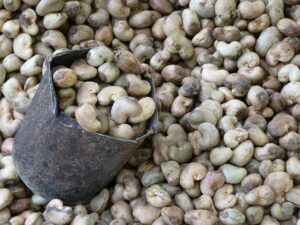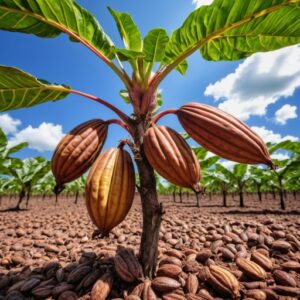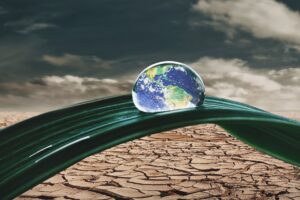Ivory Coast’s Crop Contributions
-
Cocoa: The Backbone of the Global Chocolate Industry

- Global Share: 45% of the world’s cocoa supply
- Why It Matters: Ivory Coast dominates global cocoa production, providing nearly half of the world’s supply. Think about that for a moment—without Ivorian cocoa, the global chocolate industry would collapse. Europe, with its rich history of chocolate manufacturing, would be among the hardest hit. For countries like Belgium, Switzerland, and Germany, this would mean skyrocketing costs and an eventual scarcity of cocoa. Small and artisanal chocolate businesses, often dependent on affordable Ivorian beans, could face extinction.
-
Cashews: A Growing Global Commodity
- Global Share: 10% of global cashew production

- Why It Matters: Cashews are a staple in global snack markets and an essential ingredient in many plant-based products. A world without Ivorian cashews would experience severe price hikes and supply shortages, especially in markets like Europe and North America. Consumers, who have grown accustomed to affordable, abundant cashew-based products, would feel the crunch immediately. As demand outpaces supply, countries scrambling to find alternative sources would drive up prices even further, hurting consumers’ wallets.
- Global Share: 10% of global cashew production
-
Coffee: Fueling Europe’s Coffee Culture
- Global Share:
 Significant exporter of coffee, particularly Robusta beans
Significant exporter of coffee, particularly Robusta beans - Why It Matters: Ivory Coast is a crucial supplier of Robusta coffee, a key ingredient in instant coffee and espresso blends. Without Ivorian coffee exports, global coffee prices would rise significantly, especially in Europe, where coffee consumption is ingrained in daily life. Coffee shops and retailers would face bean shortages, leading to price hikes on your morning cup of coffee. For some, the idea of a world without affordable coffee is unthinkable—but without Ivory Coast, that could become a reality.
- Global Share:
The Global Impact of Ivory Coast’s Export Cessation
1. Skyrocketing Prices: From Chocolate to Coffee
Imagine walking into your favorite supermarket or coffee shop only to find your favorite products have doubled or tripled in price—if they’re even available. Without Ivory Coast’s exports, this scenario would quickly become the norm. Chocolate would go from an everyday treat to a luxury product, and coffee would be priced out of reach for many consumers. These aren’t just theoretical outcomes; they are the real economic consequences of losing a key supplier.
2. Supply Chain Chaos: Businesses on the Brink
For industries dependent on Ivory Coast’s crops, supply chain stability would disintegrate overnight. Chocolate manufacturers, coffee distributors, and snack companies would find themselves unable to meet demand, leading to severe production slowdowns. Small businesses that rely on stable, affordable access to cocoa, cashews, or coffee would be the first to suffer, while larger corporations would scramble to secure alternative suppliers. This scramble would come at a cost—both financially and environmentally—as regions already under pressure from overfarming might become new targets for exploitation.
3. Hunger and Food Insecurity: A Broader Crisis
While chocolate and coffee may be seen as indulgences in the West, they are also essential commodities for many countries’ economies and diets. A halt in Ivorian exports would lead to food insecurity, particularly in regions that depend on cashews and coffee beans for nutrition and livelihood. The ripple effect would extend far beyond luxury goods—this would become a question of survival for vulnerable populations around the globe.
Why Sustainability and Commitment to Ivory Coast Matter
The Moral and Economic Imperative
The hypothetical disappearance of Ivory Coast’s exports isn’t just an issue of rising costs and scarcity; it exposes a deeper vulnerability in our global food systems. As the world’s population continues to grow, so too does our dependence on countries like Ivory Coast. Yet, with this dependence comes responsibility—businesses and governments must work together to support sustainable practices that ensure Ivory Coast’s natural resources and farming communities can continue to thrive.

This is why it is essential for companies in the food supply chain to commit to sustainable agricultural practices. Without these commitments, the future of global food security is at risk. Soil depletion, deforestation, and unsustainable farming methods in key regions like Ivory Coast could lead to long-term supply chain collapses—collapses we may not be able to recover from. The businesses that thrive will be the ones that invest in the long-term health of their supply chains, protecting natural resources and fostering local economies.
Economic Growth Through Sustainable Partnerships
Supporting Ivory Coast’s agricultural sector is not only an ethical necessity but also a sound business strategy. Investing in the country’s farmers, infrastructure, and sustainable practices ensures that these crops will continue to fuel global markets for years to come. Companies that build meaningful, sustainable partnerships in regions like Ivory Coast are not just securing their own futures—they are ensuring the world has access to essential resources like cocoa, coffee, and cashews. The time to act is now, before it’s too late.
Protecting the Future of Global Food Systems
A world without Ivory Coast’s crops is a world of chaos—rising prices, supply chain disruptions, and a stark divide between those who can afford basic luxuries and those who cannot. This scenario is not just a distant possibility; it’s a looming reality if we fail to prioritize sustainability in the global food supply chain. Ivory Coast’s contributions to cocoa, coffee, and cashew production are irreplaceable, and protecting these resources must be a global priority.
coffee, and cashew production are irreplaceable, and protecting these resources must be a global priority.
Businesses must commit to environmental stewardship, economic growth, and fair trade practices. Consumers must recognize the vital role countries like Ivory Coast play in our daily lives and support companies that value sustainable sourcing. By working together, we can ensure that Ivory Coast continues to feed the world and that the global food system remains resilient in the face of future challenges.
We must protect the future—because a world without Ivory Coast’s crops is a world we cannot afford to face.

